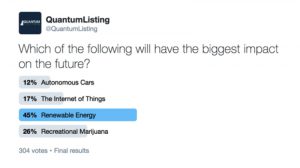Which will have the biggest impact on the future? - by David Perlmutter
“For time and the world do not stand still. Change is the law of life. And those who look only to the past or the present are certain to miss the future.” – John F. Kennedy.
For a week in October, to get our minds off the Presidential election, we conducted a Twitter poll. We posed the question, “Which of the following will have the biggest impact on the future?” The choices we offered for answers were the following: Autonomous Cars, The Internet of Things, Renewable Energy, and Recreational Marijuana. There were a total of 304 votes. Lets take a look at the results.
With 12%, autonomous or self-driving cars got the fewest votes. Autonomous cars get a lot of press, and so before the poll was launched, I thought this would fare better than it did. Tesla appears to be first to market, but reports of the fatal accident in Florida put a damper on some of the enthusiasm. However, Elon Musk and his team are not easily discouraged and have continued to make improvements that will be rolled out over the next several months to make their technology safer. Google, Uber, Apple and conventional car companies are all working on their own solutions.
The potential impacts of self-driving cars are manifold. They include increased safety, ride and car sharing, reduced need for urban parking, and convenience. Timelines for acceptance and adoption of the technology vary greatly, from a few years to more than a decade. Given that the average age of the American auto fleet is 11.5 years, it is going to take some time before there is universal adoption.
 The next lowest vote getter, with 17%, was the Internet of Things. Wikipedia’s definition of the Internet of Things (IoT) is “the Internet working of physical devices, vehicles (also referred to as “connected devices” and “smart devices,”) buildings and other items—embedded with electronics, software, sensors, actuators, and network connectivity that enable these objects to collect and exchange data.”
The next lowest vote getter, with 17%, was the Internet of Things. Wikipedia’s definition of the Internet of Things (IoT) is “the Internet working of physical devices, vehicles (also referred to as “connected devices” and “smart devices,”) buildings and other items—embedded with electronics, software, sensors, actuators, and network connectivity that enable these objects to collect and exchange data.”
With ubiquitous wi-fi and cheap chips, more and more things are being connected to the Internet. Everything from light bulbs, to refrigerators to energy management systems can be measured and managed remotely. For instance, if you have a nest thermostat, you can raise or lower the temperature in your home from your iPhone from wherever you are.
Consumers will have to decide whether the conveniences of being able to control devices in their homes outweigh the risks of having them hacked, as in the recent denial of service attacks that crashed several websites, or become outdated as manufacturers cease to support older devices. I’ve had the same locks on the doors of my house for 17 years without having to replace batteries or worrying about hackers. Do I really want or need to live in some Jetsonian fantasy where as my autonomous car pulls up to my house, the lights go on, the door unlocks, and the heat adjusts? On the other hand, to the extent that it will help save energy and resources, why not?
Recreational Marijuana ended up in second place with 26% of the votes. I did not anticipate that it would place as high (no pun intended) as it did. And, I thought, perhaps it was just people having fun at the polls, sort of like writing in Mickey Mouse in the voting booth on election day. However, upon doing a little research, I learned that in Colorado, one of the early adopters of recreational marijuana, it has had a significant economic impact. According to an analysis from the Marijuana Policy Group, more than 18,000 jobs were created and $2.4 billion was added to the state’s economy last year, and it is in the top 10% of all industries in Colorado. Recreational marijuana is on the ballot in five more states this year, and it will be interesting to see if its impact is as great elsewhere.
Renewable Energy was number one in our poll, with 45% of the vote. Although there is no control group to provide absolute scientific proof, it is pretty clear that mankind is adversely impacting our planet and the atmosphere surrounding it. Industry, industrialized agriculture and our reliance on fossil fuels are rapidly making our planet less hospitable. Big weather, rising oceans, and pollution are problems that will take decades, if not centuries or millennia to solve. Renewable energy is a major piece of the puzzle, and it is gratifying that our constituency has recognized that. If we can’t sustain life on our planet, everything else is meaningless.
David Perlmutter is the owner of QuantumListing/Perlmutter Properties, White Plains, N.Y.
Meridian Capital Group arranges 10-year retail lease for Mess at 236 West 10th St.


AI comes to public relations, but be cautious, experts say - by Harry Zlokower

Behind the post: Why reels, stories, and shorts work for CRE (and how to use them) - by Kimberly Zar Bloorian

Strategic pause - by Shallini Mehra and Chirag Doshi










.jpg)
.gif)
.gif)